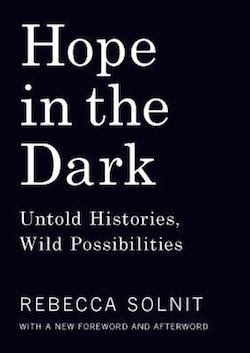Literary Event of the Week: Reading Through It Discusses Hope in the Dark
If I had to choose one, and only one, writer to help me navigate the world for the rest of my life, my choice would probably be Rebecca Solnit. Solnit is a considerate, intelligent writer; sometimes when you read her essays you can feel your own brain changing and growing to accept new information about the world. And she’s also got the power to direct the very flow of popular culture; her essay “Men Explain Things to Me” is widely regarded as the source of the word “mansplaining.”
Not many writers have the capacity and the ingenuity to identify a universal experience — in this case, that moment when a man tries to crowbar his own incorrect comprehension of the truth into a woman’s greater understanding — and give a name to it. Mansplaining has always existed, but it wasn’t a part of our vocabulary until Solnit named it. Genius isn’t the invention of something new; it’s the identification of a pattern that had always been there before, the recognition of an emotion that was never before correctly articulated. Solnit’s addition to the taxonomy of our shared experience is priceless.
For the last two months, the Seattle Review of Books and the Seattle Weekly has hosted Reading Through It, a civic-minded book club that is trying to identify the causes and meanings of Donald Trump’s presidency. Now that we’re more than a week into the Trump Administration, and now that the array of anti-science, anti-human laws and executive orders has progressed at an even more alarming rate than many of us predicted, it’s time to break out the big guns, by which I mean it’s time pit Rebecca Solnit’s brain against the world to see what happens.

Hope in the Dark: Untold Histories, Wild Possibilities was originally published in 2004, but Solnit’s Iraq War-era manifesto has found new life in the aftermath of the 2016 election. From the first line, it slaps the despairing across the face and challenges their assumptions: “Your opponents would love you to believe that it’s hopeless, that you have no power, that there’s no reason to act, that you can’t win.”
From the keyboard of a lesser writer, one could imagine those words as the preamble to a hollow pep talk. But anyone who has read Solnit before knows that she is not someone who slathers the desperate with empty words of positivity. She is, to put it bluntly, incredibly fucking smart. And if she says there’s space for hope when everything seems hopeless, you’d have to be an idiot to bet against her.
This meeting of Reading Through It should have room for plenty of meaningful conversation: can we compare a Trump administration with the unmitigated failure of a George W. Bush administration? Are we dealing with something altogether different? Do Solnit’s old words of hope still have meaning today? Do old methods of activism work anymore, or must we arm ourselves with new rhetorical weapons? Can even one of the biggest brains in contemporary writing save us now? To that last question, the answer can only be: let’s hope so.